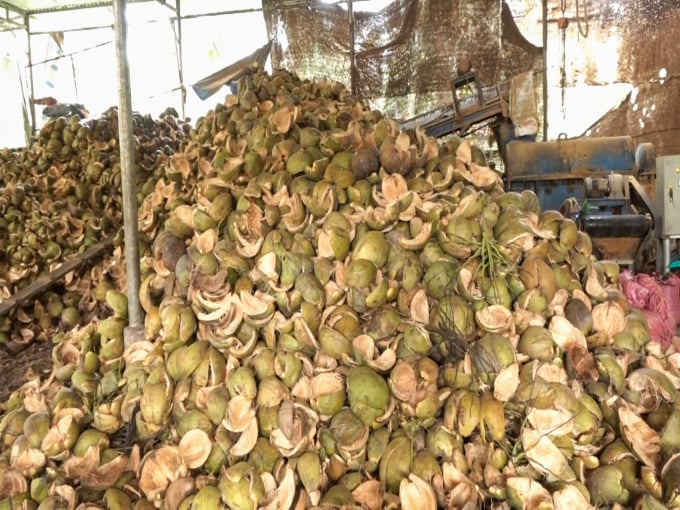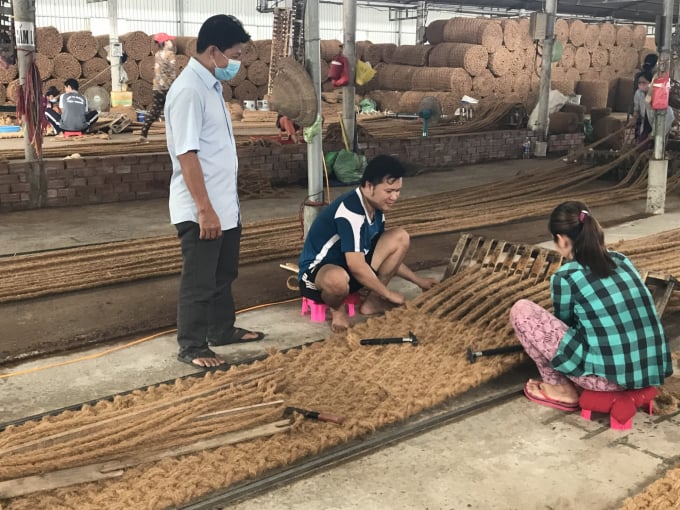June 3, 2025 | 14:56 GMT +7
June 3, 2025 | 14:56 GMT +7
Hotline: 0913.378.918
June 3, 2025 | 14:56 GMT +7
Hotline: 0913.378.918
Ben Tre province has the biggest coconut plantation in the country, covering around 75,000 ha and generating 610 million coconuts yearly. For decades, the coconut plant has been an integral part of the life of the Ben Tre people. Throughout history, despite the rapid evolution of climatic change, the coconut palm has shown its extraordinary resistance to drought and salinity. As a result, the area of coconut planting continues to grow.

Ben Tre province has the largest coconut area in the country with an area of nearly 75,000 hectares and an output of over 610 million fruits. Photo: Van Vu.
In the past, owing to undeveloped technology, just coconut water, and the trunk were utilized. While it has improved greatly in recent years, coconut by-product materials such as coir and peat are being transformed into items worth hundreds of times more.
Historically, agricultural by-products in general and the coconut processing sector in particular have considerable potential but were not fully utilized, often resulting in environmental degradation. Professional agencies and businesses in Ben Tre conducted research and applied advanced technology to convert coco peat, residue, coal mites, and crumbs..., which are all agricultural by-products discarded during the production of coconut products, into not only useful but also high-value-added products.
We visited Dong Duong coconut Company in Tan Binh commune, Mo Cay Bac district, in November. Mr. Le Thanh Tien, the company's director, is an ardent supporter of the local coconut by-product processing business.
Mr. Tien's factory processes thousands of shells into coir and coco peat. Mr. Tien supplies seedling production facilities and organic fertilizer manufacturing firms for coco peat. He runs the coir through the equipment to create little strands roughly the size of the chopsticks' tips. The product is then spun into bigger yarns and woven into coir mats using these fibers. Coir mats are quite popular in industrialized nations, particularly in Korea.

Weaving coir carpet from coir threads helps to increase the product value by dozens of times. Photo: Minh Dam.
Each coconut shell is now worth between VND 700 and 1,000, depending on the time of year. Coco peat is sold on the market for between VND 2,300 and 2,500 per kilogram. The raw fiber costs around VND 3,000 per kilogram, but the completed product costs more than VND 10,000 per kilogram. Each 10m2 carpet is exported at a cost of more than USD 45. Each month, the firm ships between 30 and 40 containers, generating around VND 5 billion in income.
Mr. Tien's factory employs hundreds of people on an average monthly wage of VND 7-12 million per worker.
According to the Ben Tre Coconut Value Chain Analysis Research Report - Ben Tre Business Development Project with the Poor, the average desiccated coconut contains 33.33 percent shell (hard fibrous fibers 3.33 percent, soft fibers 6.67 percent, and cocopeat 23.33 percent), 15 percent shell, 21.66 percent water, and 30% copra (15 percent water, 10 percent oil and 5 percent residue).
The processing coefficient from coconut shells to coco peat varies according to the coconut type, maturity, moisture level, and fiber content of the regular coconut shell: an average of 3.3 shells of coconut shells produces 1 ton of coco peat. In 2020, the province will produce approximately 146,979 tons of coco peat, of which 9,870 tons will be exported. However, the province will fall short of the 33,000 tons target set by the coconut industry development program for the 2016-2020 period due to the Covid-19 epidemic, with the remainder reserved for domestic consumption.
According to the Ben Tre province's Department of Science and Technology, coco peat can store up to eight times its capacity in water.
Mr. Dang Van Cu, Deputy Head of Finance - Planning Department, Ben Tre's Department of Science and Technology, explained: "To transform coco peat into a usable commodity with a high added value, the Department used EC treatment technology to convert it to clean soil." Then, beneficial bacteria and disease-resistant microorganisms are added to provide a high nutritional value. Clean dirt is dried to between 18 and 22 percent moisture content and pressed into finished pellets that fulfill export criteria.

Coco peat combined with vermicompost and rice husk ash creates high-value clean soil products. Photo: Minh Dam.
One may argue that this method has transformed coco peat from a waste product with no functional purpose that pollutes the environment into a valuable product: clean soil.
According to Mr. Dang Van Cu, Ben Tre's employment of biological agents to transform carbon sources (lignin and crude cellulose) contained in coco peat into fine humus compounds does not end there.
Since then, we've continued to use microbiological technology to process microbial organic fertilizers, bio-organic fertilizers, and to include additional mineral nutrients into our fertilizer products, resulting in high-quality fertilizer products. Ben Tre has once again transformed a clean soil product manufactured from coco peat sold for VND 4,200 per kg into a high-grade organic fertilizer sold for VND 50,000–60,000 per kg.
Currently, research and application of coco peat treatment and processing technology have resulted in the addition of new and diverse products made from coco peat, totaling more than seven, while also extending the value chain of coco peat products, contributing to the perfection of the coconut industry's value chain, and integrating the coconut industry into the global value chain.
Translated by Linh Linh

(VAN) TTC AgriS and IFC signed a strategic partnership to develop a sustainable agricultural value chain, aiming to achieve the Net Zero target by 2035.

(VAN) Seafood by-products are opening a new path, combining green growth and technological innovation to enhance the industry's value.

(VAN) Mr. Nguyen Thanh Cong, Vice Chairman of the Son La Provincial People's Committee, reflects on Son La’s journey from barren hills to fruitful orchards after a decade of hard work.

(VAN) FAO’s Director-General addresses the 5th Baghdad International Water Conference.
/2025/05/26/1716-4-nongnghiep-191706.jpg)
(VAN) Chain linkages, technological innovation, and raw material zoning are three strategic pillars for the coconut industry to strongly develop and elevate its position on the global agricultural map.
![Advanced mariculture – an inevitable trend: [4] Accompanied by scientists](https://t.ex-cdn.com/nongnghiepmoitruong.vn/608w/files/sohk/2025/05/13/1941-pgsts-vo-van-nha-140958_717.jpg)
(VAN) According to Assoc. Prof. Dr. Vo Van Nha, Director of the RIA III, the development of advanced offshore mariculture is no longer an option but an essential path for Vietnam’s fisheries sector.

(VAN) Vietnam is intensifying the development of mollusk farming areas that meet international standards, aiming for sustainable growth and enhancing its export position in the global seafood market.